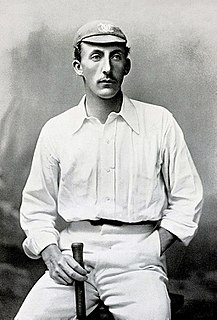Related Research Articles

Sir John Berry Hobbs, always known as Jack Hobbs, was an English professional cricketer who played for Surrey from 1905 to 1934 and for England in 61 Test matches between 1908 and 1930. Known as "The Master", he is regarded by critics as one of the greatest batsmen in the history of cricket. He is the leading run-scorer and century-maker in first-class cricket, with 61,760 runs and 199 centuries. A right-handed batsman and an occasional right-arm medium pace bowler, Hobbs also excelled as a fielder, particularly in the position of cover point.

Edward William Bastard was an English first-class cricketer who played for Oxford University and Somerset. Bastard was a slow left-arm orthodox bowler, described in his Wisden obituary as Somerset's best bowler during his time with the club. Bastard was also part of the Oxford team often said to be the university's best ever.

John Thomas Tyldesley was an English cricketer who played first-class cricket for Lancashire and Test cricket for England. He was a specialist professional batsman, usually third in the batting order, who rarely bowled and generally fielded in outfield positions.

Lionel Charles Hamilton Palairet was an English amateur cricketer who played for Somerset and Oxford University. A graceful right-handed batsman, he was selected to play Test cricket for England twice in 1902. Contemporaries judged Palairet to have one of the most attractive batting styles of the period. His obituary in The Times described him as "the most beautiful batsman of all time". An unwillingness to tour during the English winter limited Palairet's Test appearances; contemporaries believed he deserved more Test caps.
Khalid "Billy" Ibadulla is a Pakistani New Zealander cricket coach, commentator, former cricket umpire and cricketer. He has worked as TVNZ cricket commentator. He played in four Tests between 1964 and 1967.

David Bartlett Pithey was a Rhodesian cricketer who played in eight Tests for South Africa from 1963 to 1967. As well as playing for Rhodesia and Western Province, he played first-class cricket for Oxford University and Northamptonshire. Christopher Martin-Jenkins described him as "spasmodically brilliant". His brother, Tony, also played Test cricket for South Africa; they played together in five of the Tests on the 1963–64 tour of Australasia.
Michael John Froud Shrimpton was a New Zealand cricketer and coach.
Graham Atkinson was a cricketer who played first-class and List A cricket for Somerset and Lancashire. He was born in Lofthouse, Wakefield, Yorkshire, England.
Roy Cosmo Kerslake, born at Paignton, Devon on 26 December 1942, played first-class cricket for Cambridge University and Somerset, and captained Somerset for one season in 1968. More recently he has been prominent as a cricket administrator and was president of Somerset County Cricket Club from 2004–2015.
Christopher Herbert Millington Greetham played first-class cricket for Somerset from 1957 to 1966 as a middle-order batsman and a medium-pace bowler. Greetham was a tall, fair-haired right-handed batsman usually used in Somerset's late middle order and a right-arm seam bowler who, for a couple of seasons in the early 1960s, took enough wickets to be classed as an all-rounder. He was considered a good cover fielder, with a strong and accurate throw.
James Geoffrey Lomax played first-class cricket as a right-handed batsman and right-arm fast-medium bowler for Lancashire and Somerset between 1949 and 1962. He was born at Rochdale, then in Lancashire, and died at Frenchay Hospital, near Bristol.
Gerald Roscoe Bardswell was an English cricketer who played 59 first-class matches between 1894 and 1902. He was born at Woolton, Liverpool and died at New Orleans, Louisiana.
Michael David Mence was an English cricketer. Mence was a left-handed batsman who bowled right-arm medium pace. He was born at Newbury, Berkshire.
Michael Godfrey Melvin Groves is a former cricketer who played first-class cricket for Western Province, Oxford University, Somerset County Cricket Club, Marylebone Cricket Club (MCC) and the Free Foresters between 1961 and 1968. He was born at Taihape, Manawatu, New Zealand.
Edward Austen Clark is a former English cricketer. He played for Middlesex between 1959 and 1966, with occasional games thereafter until 1976.
Faqir Syed Aizazuddin, also known as Aizaz Faqir, Fakir Aizazuddin and S.A.V. Fakir, was a Pakistani cricketer.
Arthur Brian Douglas Parsons was an English cricketer who played first-class cricket from 1954 to 1964.
Ikram Elahi is a former Pakistani cricketer who played first-class cricket from 1953 to 1970. He toured England in 1954 and the West Indies in 1957-58 with the Pakistan team but did not play Test cricket.
Dudley Richard Owen-Thomas is an English lawyer and former first-class cricketer.
Terence Henderson Lee OAM is a former cricketer who played first-class cricket for New South Wales from 1962 to 1967. He later became prominent in research and development in the Australian wine industry, work for which he was awarded the Medal of the Order of Australia in 2007.
References
- ↑ Wisden 1961, pp. 753-54.
- ↑ Wisden 1962, p. 690.
- ↑ Wisden 1963, p. 713.
- ↑ Duncan Worsley batting by team
- ↑ Lancashire v Surrey 1964
- ↑ Wisden 1963, p. 104.
- ↑ Wisden 1967, p. 460.
- ↑ Wisden 1968, p. 465.
- ↑ Bolton League Cricket Legends – Duncan Worsley Retrieved 1 October 2014.